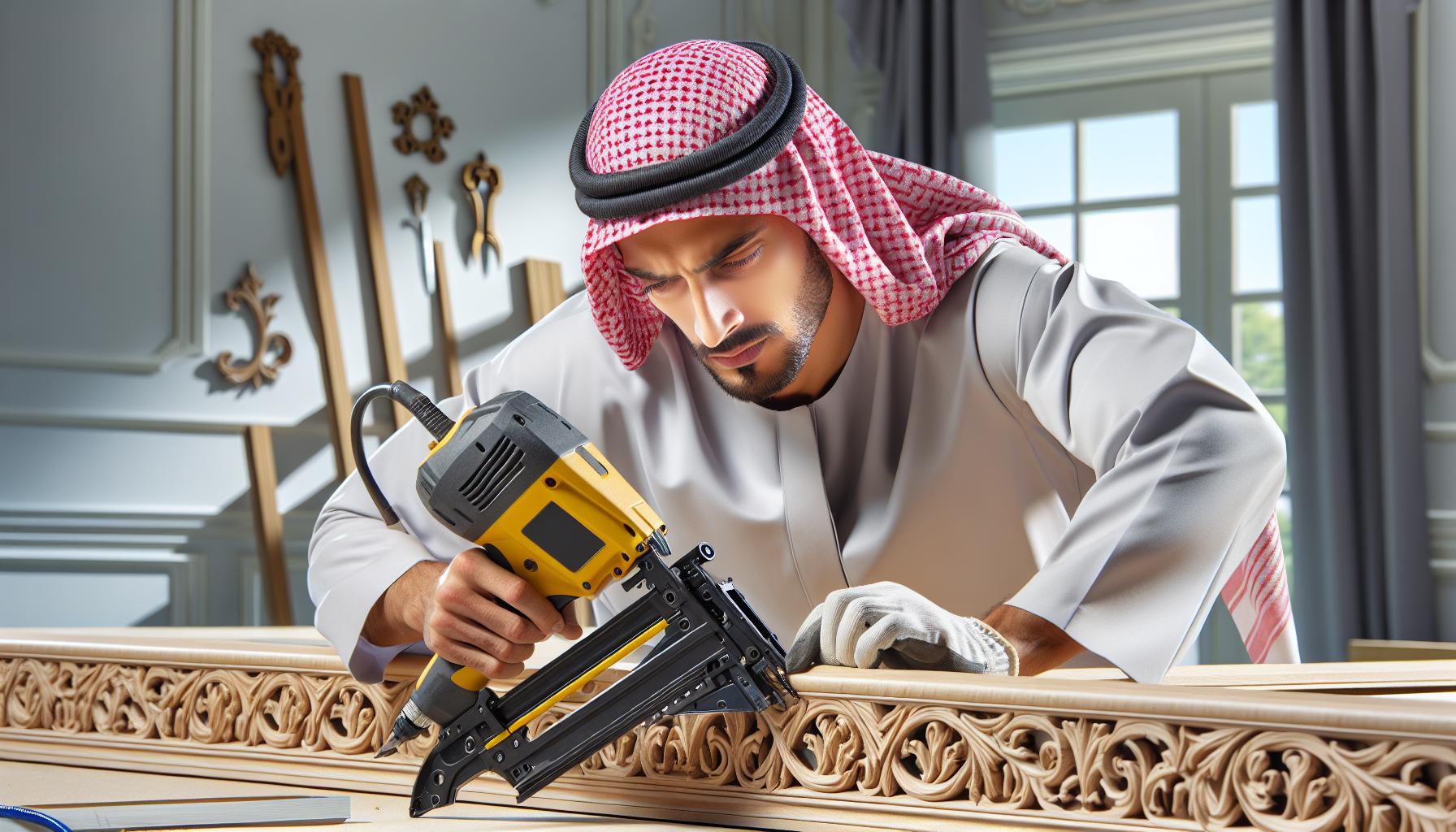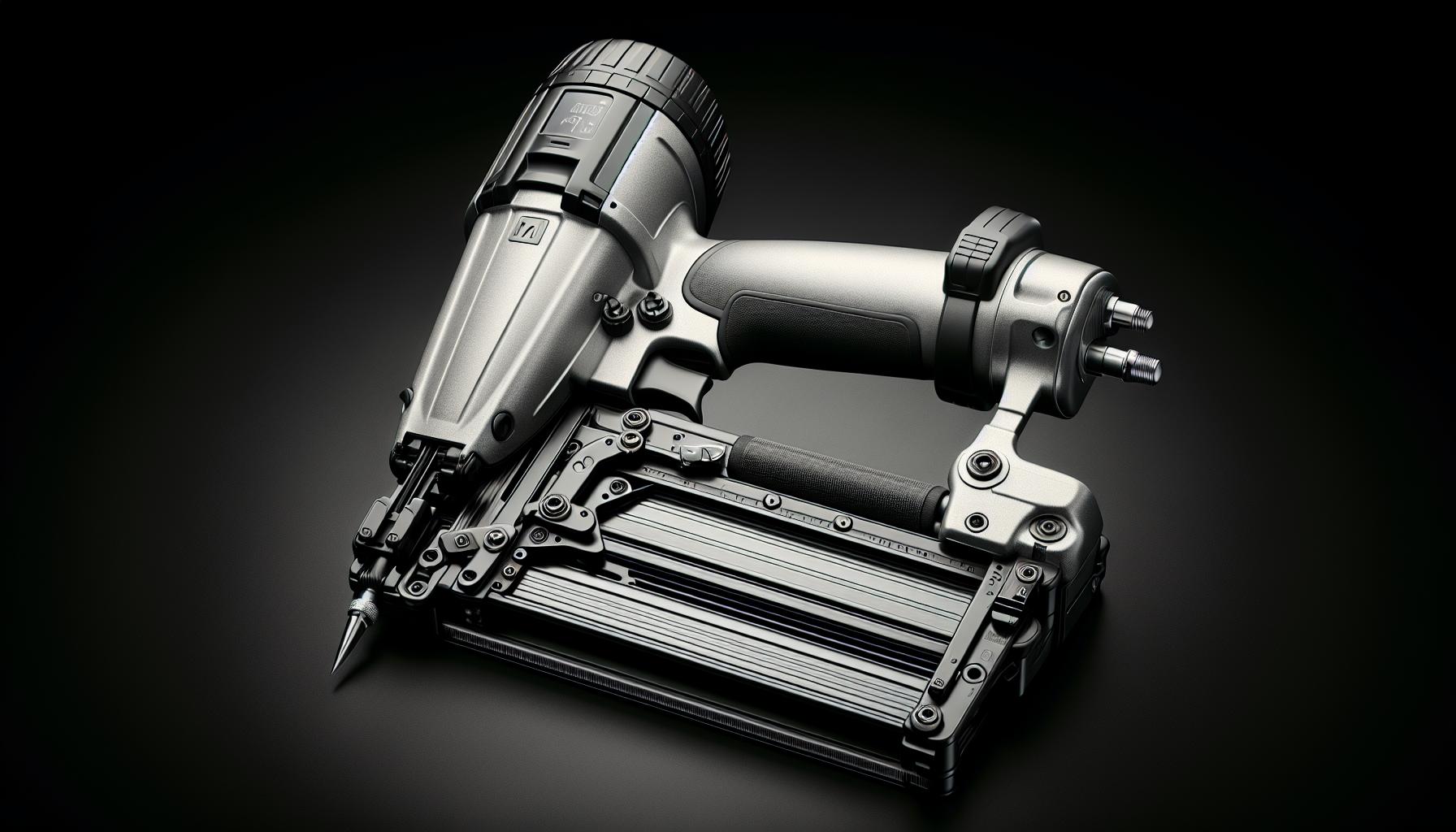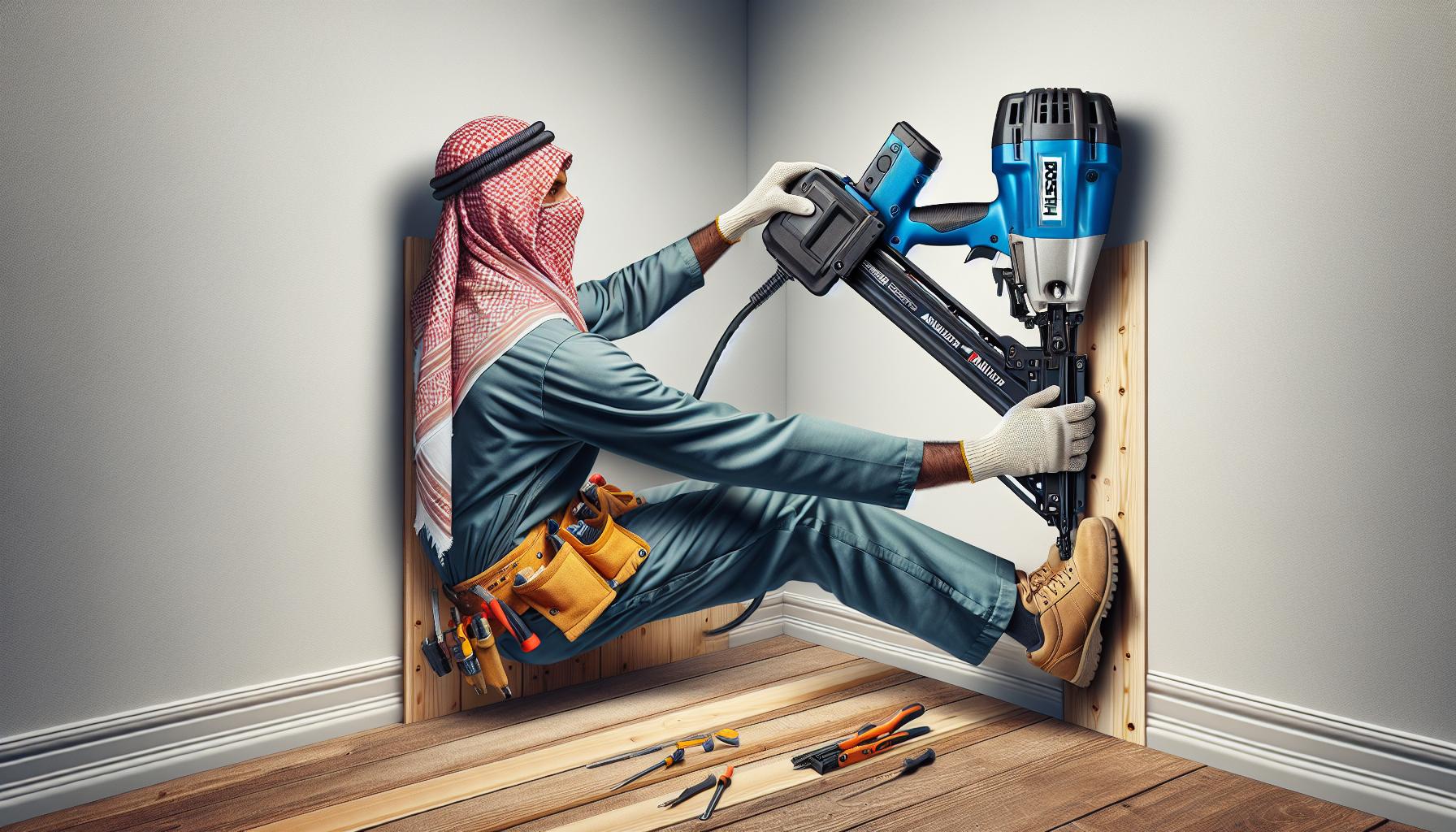When it comes to precision nailing, a reliable finish nailer is a game-changer. I’ve had my fair share of experience with various brands, but Bostich and DeWalt stand out for their angled finish nailers. Each boasts unique features that cater to different woodworking needs.
I’ll dive into the nitty-gritty of Bostich vs. DeWalt angled finish nailers. Whether you’re a seasoned carpenter or a DIY enthusiast, choosing the right tool can make all the difference in your projects. Let’s explore what sets these powerhouses apart and help you decide which nailer will best suit your workshop arsenal.
Bostich vs. DeWalt Finish Nailer Angled
When it comes to woodworking, precision and reliability are non-negotiable. Over my years of woodworking, I’ve come to realize that Bostich and DeWalt are among the top contenders in the finish nailer market. Both brands offer angled finish nailers that promise to deliver professional-grade results, but they do so with their own set of features.
The Bostich finish nailers are revered for their Lightweight Design and Smart Point Technology. What sets Bostich apart is the easy nail placement which allows for more accurate work without needing to compress the contact trip to actuate the tool. This means I can get my work done faster and with less hassle.
On the other hand, DeWalt boasts their finish nailers with Precision Point Technology, which means minimal need to push against the workpiece, allowing for easy use in tight spaces. DeWalt nailers also come with Tool-Free Jam Release which is a lifesaver when dealing with jams.
Let me break down some key specifications:
| Feature | Bostich | DeWalt |
|---|---|---|
| Nail Size | 1.25″ – 2.5″ | 1.25″ – 2.5″ |
| Magazine Angle | 34 degrees | 33 degrees |
| Weight | Lightweight, around 3.8 lbs | Slightly heavier, around 4.2 lbs |
| Operating Pressure | 70 – 120 PSI | 70 – 120 PSI |
| Special Technology | Smart Point | Precision Point |
| Tool-Free Jam Release | Available | Available |
Durability is also a must, and both nailers have proven to stand the test of time. Bostich nailers have an Integrated Air Blower that clears away debris, preserving the nailer’s lifespan and function. DeWalt’s nailers have an Integrated LED Light that not only helps in low-light conditions but also aids in the longevity of the tool by preventing accidental damage due to poor visibility.
Why Precision Nailing Matters
When it comes to finish carpentry, the details can make or break a project. That’s where precision nailing truly shows its worth. Precise nail placement is critical in trim work since inaccuracies are immediately noticeable and can lead to a slew of issues, from cosmetic flaws to structural instability.
I’ve experienced firsthand the benefits of Bostich’s Smart Point Technology and DeWalt’s Precision Point Technology. Both are designed to enable finish carpenters like myself to place nails exactly where they need to be. The difference in the final look of a piece when using these technologies is day and night.
But it’s not just about the aesthetics. Exact nail placement prevents damage to the work surface. There’s nothing more frustrating than splitting a piece of trim because the nailer wasn’t precise. These specialized finish nailers help prevent such mishaps, making my job far smoother and the results more professional.
The nature of angled finish nailers also adds to their precision capabilities. It allows for better access to tight corners and spaces where straight nailers can’t reach. This is particularly useful in intricate trim work or when dealing alongside obstructed areas. Given that Bostich and DeWalt both excel in designing tools that address these challenges, it’s clear that they understand what’s at stake.
Here are a few areas where precision nailing is particularly important:
- Crown Molding Installation: Angles need to be perfect or the joints will not align.
- Wainscoting and Paneling: Uneven nailing can cause warping or buckling over time.
- Door and Window Casing: It’s essential for proper alignment and fit to prevent drafts and movement.
By leveraging the angled design and the precise placement technologies of both Bostich and DeWalt, I’ve been able to achieve professional-grade results every time. Precision nailing is not just a detail; it’s a requirement for quality craftsmanship. With tools designed to make each nail count, even the most complex finishes are within my reach.
Features to Consider in a Finish Nailer
When embarking on a project, I’m always looking for a finish nailer that will meet my specific needs. Several crucial factors come into play.
Weight and Balance
The ease of handling a finish nailer is paramount. A nailer that’s too heavy can cause fatigue over time, and one that’s poorly balanced might make precision work harder than it needs to be. Brands like Bostich and DeWalt often incorporate ergonomic designs to enhance the user experience.
Nail Size Compatibility
Different tasks require different nail sizes. One of the things I check is the range of nail sizes that the finish nailer can accommodate. Having a versatile tool means I can tackle a broader scope of projects without needing multiple nailers.
- Bostich models frequently support nail sizes from 1 ¼-inch to 2 ½-inch.
- DeWalt units often enable users to work with similar nail lengths.
Depth Adjustment
Being able to adjust the depth at which nails are driven is critical for precision. Both Bostich and DeWalt offer easy-to-use depth adjustment features, allowing for a flush finish or slight indentation as needed.
Power Source
The choice between pneumatic and battery-powered finish nailers comes down to personal preference and task requirements.
- Pneumatic nailers are known for consistent driving power.
- Battery-powered models emphasize portability.
While DeWalt has made significant strides in battery technology, Bostich also offers reliable pneumatic tools.
Durability and Warranty
Durability can’t be overlooked. It’s a given that I prefer a tool that can withstand the knocks and bumps of everyday usage. Most high-quality finish nailers come with competent warranties, showcasing the manufacturer’s confidence in their product’s longevity.
Price vs. Performance
Finally, price always plays a role. It’s not just about the initial investment; it’s about the value over time. When considering the cost, I factor in performance, efficiency, ease of use, and how often I’ll be using the finish nailer.
Both Bostich and DeWalt have competitive features, but in different ways. It’s essential to weigh these features against the requirements of the job at hand. Understanding the balance between these elements helps in making an informed decision.
Bostich Finish Nailer Angled: A Closer Look
When examining the Bostich finish nailer’s angled design, it’s evident that it offers significant advantages in finish carpentry. The meticulously engineered angle allows for exceptional maneuverability, which is crucial for nailing in tight spaces and corners where a straight nailer simply can’t reach.
The ergonomic design of the Bostich nailer doesn’t just stop at its angle. It also boasts a lightweight build, which reduces arm fatigue during prolonged use. This is vitally important for professionals who depend on their tools to work just as hard as they do. Weight and balance are critical, and Bostich has clearly considered this in their design process to make the user’s job easier and more efficient.
Nail size compatibility is another feature where the Bostich excels. It can handle nails of various lengths with ease, making it a versatile tool for a range of finishing projects. This versatility is coupled with an easy-to-use depth adjustment system, which allows for precise control over nail sink with no need for cumbersome tool adjustments.
Power source is a key consideration as well. Many of Bostich’s models operate on a pneumatic power source, which offers consistent driving force and reliability—a must-have for any serious carpenter. It’s also worth noting that Bostich nailers are built to last, featuring durable construction that can withstand the wear and tear of active job sites.
Finally, warranties and after-sales support can’t be overlooked. Bostich provides robust support and warranties for their finish nailers, ensuring that you’re covered in the occasional instance that something goes wrong.
When I consider the features that are critical for professional finish carpentry—the angle, balance, nail size compatibility, depth adjustment, and power source—I’m reminded that tools are more than just their basic function; they’re an investment in quality and efficiency. And in this respect, Bostich’s finish nailer stands out as a tool designed with the user’s needs in mind.
DeWalt Finish Nailer Angled: A Closer Look
When considering the DeWalt finish nailer, it’s clear that precision and ergonomics are at the forefront of its design. The angled magazine allows for better accessibility in tight spaces, a crucial feature for trim carpenters and DIY enthusiasts alike. I’ve found that this design not only eases the application of nails in confined areas but also helps maintain consistency in nail placement, an essential aspect of finish carpentry.
The Precision Point Technology of the DeWalt nailer ensures that each nail is driven with accuracy. As I maneuver the tool, I notice how the smaller nose provides a clearer line of sight, which is indispensable for detailed work where every millimeter counts. It’s a game-changer for jobs that require exactitude, like crown molding or cabinetry because it reduces the risk of error and workpiece spoilage.
Moreover, the DeWalt finish nailer is tailored for a range of nail sizes, accommodating those tight-corner jobs without compromising on holding power. Its depth adjustment feature is not only user-friendly but accurate and reliable, which helps adapt to various materials and project requirements quickly.
When it comes to durability, this nailer is encased in a rugged aluminum body that withstands the rigors of a job site. The use of durable materials ensures that the tool can take a beating and continue to perform, which is critical for professionals who rely on their tools every day.
The pneumatic power source of the DeWalt nailer guarantees consistent driving strength and speed, key for jobs that demand a high volume of nailing. I’ve personally experienced the frustration of inconsistent power when using lesser quality nailers, and this is where DeWalt’s engineering really shines.
The balance of the tool is another aspect worth mentioning. It feels comfortable in my hand, with weight distribution that minimizes fatigue during extended use. This balance, paired with the nailer’s anti-slip grip, makes for a dependable tool that I can use for hours on end without significant strain.
Lastly, DeWalt’s warranty and customer service offer added peace of mind. They provide a solid warranty period, ensuring that if an issue arises, I’m covered. This commitment to customer satisfaction is evident and reinforces my confidence in the nailer as a long-term investment.
Comparing Bostich and DeWalt Finish Nailers
When you’re facing the decision between a Bostich or a DeWalt finish nailer, several key aspects come to mind. I’ve been working with both brands, and it’s clear that each has carved out its own place in the finish carpentry market. It’s not just about brand loyalty; it’s about performance, durability, and the nuances that make each tool a fit for specific tasks.
Bostich finish nailers are often praised for the Smart Point Technology. This innovative feature allows for easy nail placement thanks to a smaller nose which offers greater visibility. It’s a game-changer for jobs requiring meticulous accuracy. The tool’s design offers an efficient, straightforward approach to precise nailing, making it a favorite for fine carpentry projects where detail is paramount.
On the other hand, DeWalt finish nailers boast their Precision Point Technology. The precise nature of the technology provides an unrivaled advantage, particularly when working in tight spaces. DeWalt’s commitment to ease-of-use is evident in their tools’ design – their finish nailers typically feature a compact, angled design and a non-marring tip that maintains the integrity of your workpiece.
The comparison reveals that both Bostich and DeWalt have a strong focus on precision. However, they cater to this requirement in slightly different ways. Bostich’s Smart Point Technology simplifies nail placement, which is crucial for projects demanding high accuracy. Meanwhile, DeWalt’s finish nailers come armed with design elements that support impeccable finish work in challenging areas.
For those looking at the long-term value, it’s important to consider the build quality. DeWalt’s durable aluminum body hints at a tool that’s made to last, whereas Bostich doesn’t shy away from robust construction either. Both brands support their tools with solid warranties and customer service, letting you invest with confidence.
Let’s delve into the specifics of each brand’s offerings:
- Bostich Finish Nailers:
- DeWalt Finish Nailers:
Choosing the Right Nail Gun for Your Needs
When selecting the right finish nailer, it’s essential to consider the types of projects you’ll tackle. The Bostich and DeWalt nailers have features that cater to different needs.
For tight spaces and intricate trim work, an angled finish nailer can be a game-changer. Both the Bostich Smart Point and DeWalt Precision Point technologies offer sleek, angled designs that fit into corners and confined areas where a straight nailer might struggle.
The size and type of nails you’re planning to use should also influence your decision. If you’re working with a variety of nail sizes, you’ll want a nailer that’s versatile. DeWalt nailers are known for their compatibility with a range of nail sizes, which makes them perfect for jobs that require flexibility.
Let’s talk about durability. The materials used in the construction of the nailer can impact its longevity. I’ve found that DeWalt’s durable aluminum body stands up to rigorous use, making it a solid choice for heavy-duty projects.
Another crucial aspect is ease of use. Depth adjustment plays a pivotal role in precision nailing. DeWalt nailers typically offer user-friendly depth adjustment features, ensuring your nails are set consistently at the correct depth without requiring too much fuss.
Lastly, don’t overlook the importance of a good power source. Pneumatic nailers, like the ones from DeWalt, provide consistent driving strength, crucial for tasks that require repetitive nailing. The reliability of a pneumatic power source can significantly enhance your work efficiency.
Selecting the right finish nailer is about balancing the specifics of your work with the features that will make those tasks easier and more efficient. Whether it’s the Smart Point or Precision Point technology, the type of nails, the construction of the tool, ease of adjustment, or the power source, there’s a nailer out there that’s the right fit for your projects.
Conclusion
Choosing between Bostich and DeWalt finish nailers boils down to personal preference and the specifics of your project. Both brands offer innovative technologies that ensure precision nailing, a critical aspect of fine carpentry. It’s clear that whether you’re working in tight spaces or require consistent performance, these tools are designed to meet high standards. I’ve found that considering the project’s demands alongside the nailer’s features is key to making an informed decision. Remember, the right tool not only enhances the quality of your work but also adds to the ease and efficiency of your workflow. So take your time, weigh your options, and pick a finish nailer that aligns with your craftsmanship goals.
Frequently Asked Questions
What is the significance of precision nailing in finish carpentry?
Precision nailing is crucial in finish carpentry because it ensures the nails are placed accurately without damaging the work surface, resulting in a professional-grade finish and preserving the integrity of the materials.
How do Bostich’s Smart Point Technology and DeWalt’s Precision Point Technology differ?
Bostich’s Smart Point Technology and DeWalt’s Precision Point Technology both aim to enhance nail placement accuracy. The specifics of their technologies may differ, but both provide improved visibility and precision for finish carpenters.
Why is exact nail placement important?
Exact nail placement prevents damage to delicate work surfaces, reduces the need for additional wood filler or sanding, and contributes to the direct adherence of trim or moldings, thus enhancing the overall quality of the craftsmanship.
What advantages do angled nailers have in finish carpentry?
Angled nailers provide better access to tight corners and spaces, making them extremely valuable in finish carpentry for installing trim and molding in difficult-to-reach areas.
What should be considered when selecting a finish nailer for a project?
When selecting a finish nailer, consider the type of projects you’ll undertake, the size and type of nails needed, the durability and ease of use of the nailer, and the preferred power source (pneumatic or battery-powered), balancing these with the features that best facilitate your work.



Reader Interactions